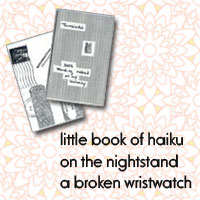A little book of haiku by you!
Launch gallery slideshow

| Swap Homepage: | http://haikuforum.com/community/viewtopic.php?p=2#2 |
| Swap Coordinator: | melissa (contact) |
| Swap categories: | Books Zines Letters & Writing |
| Number of people in swap: | 13 |
| Location: | Other |
| Type: | None |
| Last day to signup/drop: | January 30, 2008 |
| Date items must be sent by: | February 5, 2008 |
| Number of swap partners: | 1 |
| Description: | |
|
I love making little books from one sheet of paper (here's a tutorial I found on google that explains it better than I can without pictures http://www.flickr.com/photos/elizabethgenco/sets/72157594276405114/). For this swap, make one book from one sheet of paper, write 6-8 original haiku poems (6 if you have a front and back cover for your book, 8 if you use all the pages of your book), and send it to your swap partner. You can hand-write, use your computer and lay it out with fancy graphics, decorate or embellish, leave it stark and Zen... whatever you like, so long as it contains 6-8 original haiku poems and is contained on one sheet of paper. Make copies and send it to your friends, confuse your neighbors, leave on tables at Starbucks... or keep it a one-of-a-kind original... just don't forget to send it to your swap partner! Couldn't be easier! This swap is in honor of my new project http://haikuforum.com -- if you're a poet or fan of haiku and short verse, please do join the forum and jump on in! | |
- Info:
- Home
- |
- About
- |
- Forum Rules
- |
- Terms of Use
- |
- Press
- |
- Advertising
- |
- Blog
- |
- Graphics & Stuff
- Help:
- New User Info
- |
- FAQ
- |
- Group Info
- |
- Glossary
- |
- Forums
- |
- |
- Contact Admin

